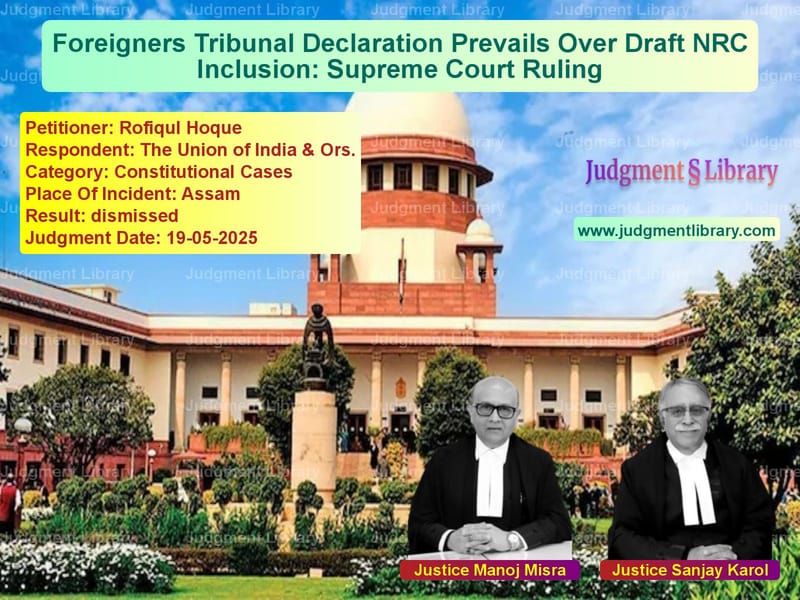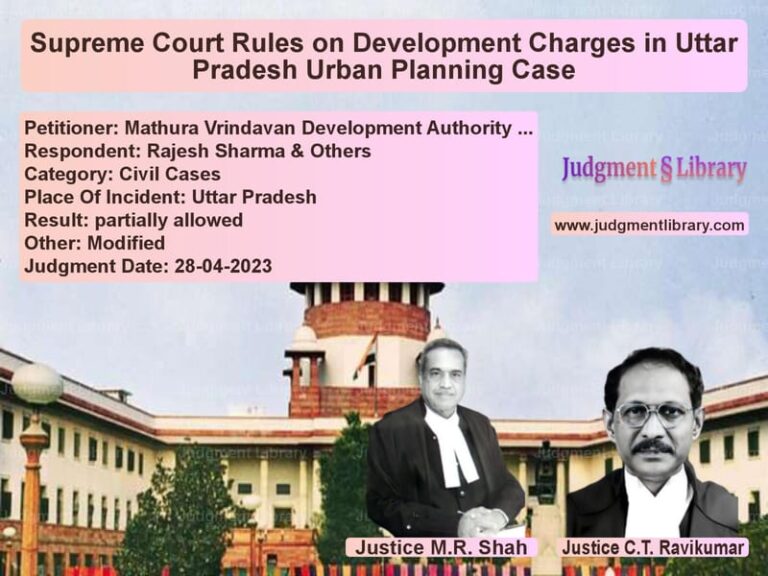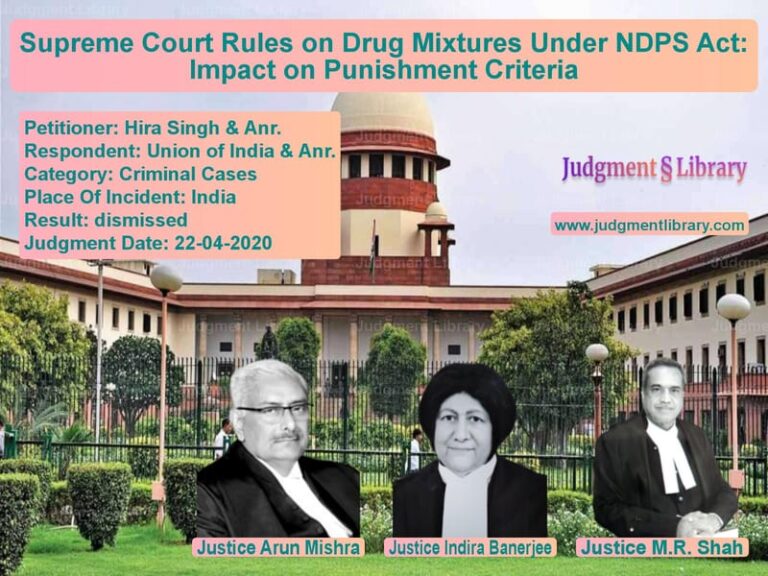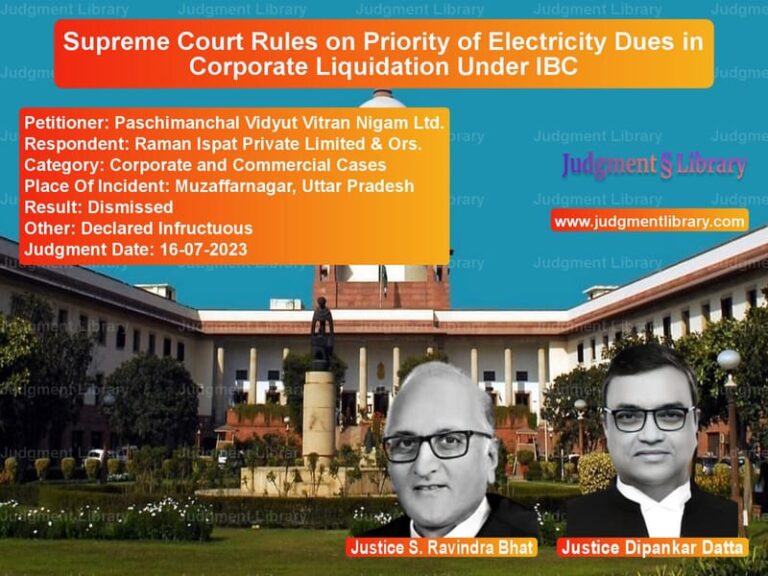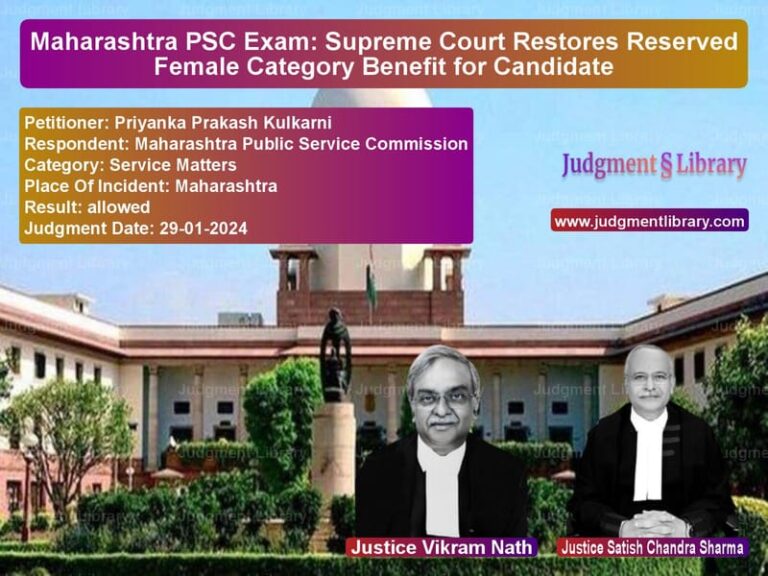Foreigners Tribunal Declaration Prevails Over Draft NRC Inclusion: Supreme Court Ruling
In a significant judgment that clarifies the complex interplay between Foreigners Tribunal declarations and the National Register of Citizens (NRC) process in Assam, the Supreme Court has delivered a crucial verdict upholding the primacy of judicial determinations over administrative listings. The case of Rofiqul Hoque vs. The Union of India & Ors. involved a man who, despite being declared a foreigner by the Foreigners Tribunal and having that decision affirmed by the High Court, found his name included in the draft NRC published in 2018, creating a legal paradox that required the Supreme Court’s intervention.
The appellant, Rofiqul Hoque, had been declared a foreigner by the Foreigners Tribunal in Jorhat, Assam, through an order dated March 4, 2017, which found that he had entered India illegally after March 25, 1971. This declaration was challenged before the Guwahati High Court, which dismissed his petition, leading to his detention. However, in a surprising turn of events, his name appeared in the draft NRC published on July 30, 2018, prompting him to approach the Supreme Court with the hope that this administrative inclusion would override the judicial declaration against him.
The Citizenship Claim and Documentary Evidence
Rofiqul Hoque based his claim to Indian citizenship on his assertion that he was the son of Md. Majut Ali, a resident of Daobhangi village in Dhubri district, and that his grandfather was Joynal Abdin Seikh. To substantiate his claim, he presented several documents before the Tribunal, including a school leaving certificate, extracts from voter lists from 1966, 1970, 1993, 2010, and 2016.
The school certificate, issued in 2014, certified that Rofiqul Hoque was the son of Majut Ali and Sopia Bibi of Daobhangi village, with a date of birth of July 20, 1996. The voter lists were intended to establish the continuous presence of his family in Assam before the critical cutoff date of March 25, 1971.
The Tribunal’s Scrutiny and Findings
Both the Foreigners Tribunal and the High Court identified multiple discrepancies in the documents presented by the appellant. The Tribunal noted that place of residence of Joynal Abdin as reflected in the voter lists was at variance with what was claimed by the appellant. Specifically, in the 1993 voter list, Joynal Abdin was shown as a resident of Kekurchar village, while the appellant claimed residence in Daobhangi village. The Tribunal observed that appellant nowhere stated that his grandfather shifted from one village to the other and therefore found it difficult to hold that Joynal Abdin Seikh son of Rahim Munshi of Daobhangi village and Joynal Abdin Seikh son of Rahim Seikh of Kekurchar village were one and the same person.
The High Court’s Detailed Analysis
The High Court conducted an exhaustive examination of the evidence and highlighted numerous defects:
The school leaving certificate was deemed unreliable because it was a duplicate issued ten years after the appellant left school, with no explanation for the delay, and the headmaster wasn’t examined to prove its contents.
The voter lists showed inconsistent ages and residential details. For instance, Moriyom Bibi (claimed as grandmother) appeared for the first time in the 1970 voter list at age 27, which the Court found surprising since she should have appeared in the 1966 list if she was indeed of voting age.
There were age discrepancies for Joynal Abdin across different voter lists, and the appellant’s mother, Sopia Bibi, was conspicuously absent from the 1993 voter list.
The High Court noted overwriting in the age of Sopia Bibi in the 2016 voter list, casting doubt on the document’s genuineness.
After this thorough analysis, the High Court concluded that net result of the above discussion is that petitioner had failed to discharge his burden under section 9 of the Foreigners Act, 1946 to prove that he was not a foreigner but a citizen of India. The Court further observed that the narrative presented by the petitioner suffered from multiple material contradictions and omissions rendering the same not only suspicious but highly improbable.
The Appellant’s Arguments Before the Supreme Court
Before the Supreme Court, the appellant’s counsel advanced several arguments. The primary contention was that once the name of the appellant stands included in the draft NRC, the order of the Tribunal, declaring him a foreigner, and of the High Court, affirming the order of the Tribunal, cannot be sustained.
Additionally, it was argued that the Tribunal and the High Court adopted a pedantic approach in holding that the appellant had failed to discharge the burden. The appellant’s counsel contended that minor discrepancies in the voter list are to be ignored as these entries are not within the control of the voter.
Regarding the change in residence locations across documents, it was argued that a citizen of the country is free to travel from one place to the other and therefore, on mere change of domicile from one village to the other the nationality cannot be doubted.
The Respondents’ Counter-Arguments
The respondents, representing the Union of India, presented compelling counter-arguments. They submitted that a declaration made by the Tribunal that a person is a foreigner does not get effaced or annulled by mere inclusion of that person’s name in the draft NRC because the proceedings of the Tribunal are quasi-judicial in nature and once a declaration is made by it, the same can be set aside only by a superior court and not by the Registering Authority.
They emphasized that the discrepancies in the documents furnished by the appellant by way of proof of his citizenship were not only in respect of residence of the persons through whom the appellant claimed to be a citizen but also in respect of the school certificate, which was found doubtful and bogus. Therefore, since by Section 9 of the 1946 Act burden is on the proceedee, the finding of the Tribunal cannot be faulted.
The Supreme Court’s Legal Analysis
The Supreme Court bench comprising Justices Manoj Misra and Sanjay Karol framed two key issues for determination: whether the findings of the Tribunal and High Court suffered from legal infirmity, and whether inclusion in the draft NRC invalidated the Foreigners Tribunal declaration.
On the first issue, the Court emphasized that Section 9 of the 1946 Act places the burden of proof on the proceedee to prove that he is not a foreigner. The Court found that the appellant had failed to discharge this burden satisfactorily.
The Court noted that the Tribunal as well as the High Court have considered these documents and have found that those earlier voter lists relate to a person located in some other village than the one of which the appellant claimed to be a resident. In such circumstances, the appellant ought to have stated in his affidavit, or demonstrated by some documentary evidence, that his ancestors had migrated from that village to the other village where the appellant was reported to be residing, but, according to the Tribunal, there was no such claim by the appellant in his affidavit.
The Court also found the school leaving certificate questionable, noting that there appeared no reason for it to have been obtained 10 years after passing from the institution and that the headmaster of the school was not called for to prove the authenticity of the certificate of which duplicate was produced.
The Court concluded that if the Tribunal and the High Court held that the appellant could not discharge his burden of proving that he is not a foreigner, the view taken by them cannot be held perverse, or manifestly erroneous, or unreasonable, as to warrant interference under Article 136 of the Constitution of India.
The Crucial NRC Issue
On the second issue regarding the effect of the appellant’s inclusion in the draft NRC, the Court delivered a definitive interpretation of the relevant legal provisions. The Court examined Rule 4A of the Citizenship (Registration of Citizens and Issue of National Identity Cards) Rules, 2003, and particularly paragraph 3 of the Schedule, which explicitly states that the names of persons who have been declared as illegal migrants or foreigners by the competent authority shall not be included in the consolidated list.
The Court relied on its earlier three-judge bench decision in Abdul Kuddus vs. Union of India and others (2019), which had held that It is obvious to us that the persons covered by the sub-para (2) to para 3 of the Schedule i.e. persons who have been declared to be illegal migrants or foreigners by the competent authority fall in a separate and distinct class and in such cases, no enquiry or investigation is required to be conducted… Such persons cannot, in terms of the specific language used in sub-para (2) to para 3 of the schedule, be included in the National Register of Citizens.
The Abdul Kuddus judgment had further clarified that The reason as is evident is that their citizenship status has already been determined by the competent authority. A person once declared an illegal migrant or a foreigner cannot claim or put forth the claim to the citizenship of India on the basis that he/she has been residing in the state of Assam.
The Court also endorsed the Abdul Kuddus interpretation of “competent authority,” which held that the competent authority referred to in sub-para (2) to para 3 of the Schedule would be, without a doubt, the Tribunal constituted under the Foreigners Act.
Based on this established legal position, the Supreme Court concluded that consequent to the declaration by the Tribunal that appellant is a foreigner, the name of the appellant could not have been included in the draft NRC and, secondly, even if it has been included, it would not annul the declaration made by the Tribunal.
Final Outcome and Implications
The Supreme Court dismissed the appeal, upholding the Foreigners Tribunal’s declaration that Rofiqul Hoque is a foreigner. The Court discharged the interim order that had granted him release from detention, meaning he would be treated as a foreigner according to law.
This judgment has significant implications for the citizenship determination process in Assam. It establishes clearly that a judicial declaration by a Foreigners Tribunal takes precedence over administrative inclusion in the NRC. The ruling prevents a situation where individuals declared as foreigners through quasi-judicial processes could use subsequent administrative listings to override those determinations.
The judgment also reinforces the principle that the burden of proof in citizenship matters rests squarely on the individual claiming citizenship, and that documentary evidence must be consistent and credible to discharge this burden. Minor discrepancies might be excusable, but multiple material contradictions and omissions across documents can prove fatal to a citizenship claim.
For the thousands of individuals going through similar citizenship determination processes in Assam, this judgment serves as an important precedent about the relationship between different mechanisms of citizenship verification and the hierarchy of authority among them.
Petitioner Name: Rofiqul Hoque.Respondent Name: The Union of India & Ors..Judgment By: Justice Manoj Misra, Justice Sanjay Karol.Place Of Incident: Assam.Judgment Date: 19-05-2025.Result: dismissed.
Don’t miss out on the full details! Download the complete judgment in PDF format below and gain valuable insights instantly!
Download Judgment: rofiqul-hoque-vs-the-union-of-india-&-supreme-court-of-india-judgment-dated-19-05-2025.pdf
Directly Download Judgment: Directly download this Judgment
See all petitions in Fundamental Rights
See all petitions in Constitution Interpretation
See all petitions in Public Interest Litigation
See all petitions in Judgment by Manoj Misra
See all petitions in Judgment by Sanjay Karol
See all petitions in dismissed
See all petitions in supreme court of India judgments May 2025
See all petitions in 2025 judgments
See all posts in Constitutional Cases Category
See all allowed petitions in Constitutional Cases Category
See all Dismissed petitions in Constitutional Cases Category
See all partially allowed petitions in Constitutional Cases Category

